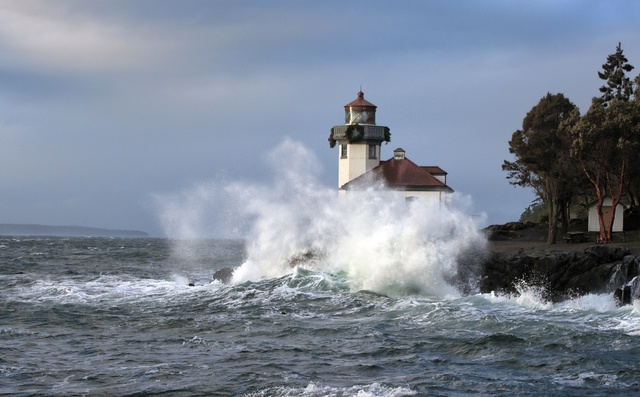The beginning of this winter has been a blustery one to say the least, with frequent wind advisories and storm warnings as weather fronts batter the Pacific Northwest up and down the coast. A dry summer that created a state of emergency of drought in parts of Washington and raging wildfires turned into a winter of wind and rain, causing flooding in a number of cities in Washington and Oregon. Here on the islands trees have blown over, the power has gone out a few times and the ferry rides have gotten rougher.
John Willis, Olga weather reporter for the Journal, said that the winds have been strong, but that the storms haven’t been unusual for this time of year.
“It’s not the worst winter we’ve ever had and it’s pretty normal in an El Nino year to have storms like this,” Willis said, recounting years like 1989 all the way back to the winter of 1949-1950.
Willis said to those who haven’t been on the islands long it might seem unusual, especially in comparison to last year’s mild winter and this year’s dry summer. Willis said that Orcas Island has exceeded its average yearly rainfall by an inch so far, and expects to be over the average by around 2-3 inches by the end of the year.
The winds this year have been consistently impressive, especially at South Beach, American Camp and Lime Kiln Park.
According to Ian Sterling, spokesman for the Washington State Ferries, six vehicles were damaged over the weekend of Dec. 5 and Dec. 6 due to waves causing vehicles to shift during transit. The damage occurred to three cars both days on the Yakima on Saturday and Elwha on Sunday, when the ferry’s wind gauge measured gusts at 134 mph.
“This is a really rare event for us, usually this stuff happens once a year whole system wide, not six weekend-wide,” Sterling said. “We sail through a lot of different kinds of weather. This storm was extraordinary in terms of wind speeds, in times it was above 100 mph gusts, and ferries are very exposed on the open water.”
Sterling said it happens when vehicles shift and lurch forward or backwards, and that most of the damage was to the fenders.
The WSF has a tort claim process, which acts similarly to insurance for people who’s vehicles have been damaged, Sterling said. Ferry workers notify the passengers of the process so they may file a claim.
Sterling said in extremely inclement weather, workers try to minimize damage by parking cars away from the front of the boat to avoid crashing waves, and encourages passengers to engage their emergency brake to prevent cars from rocking backwards and forwards.
“Mother nature’s the boss, so it’s always a balance of loss of service with making sure it’s safe to travel,” Sterling said.
For weather advisories visit www.noaa.com




